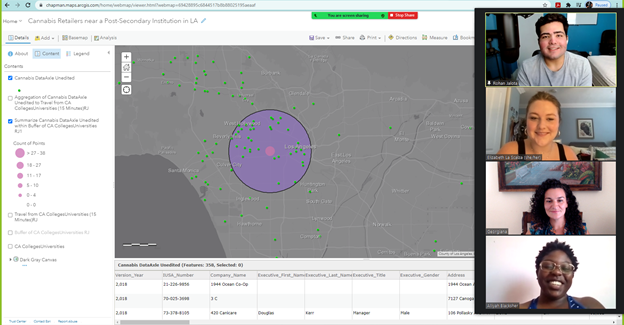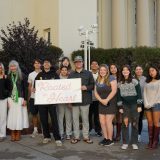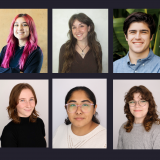
From Our Eyes: My Chapman Research Experience
August 30, 2021
I’m Elizabeth La Scalza, a recent Chapman alumna and Sociology major. I wanted to share my experience being an undergraduate research assistant during my time at Chapman. I’ve always had an interest in the social sciences, activism, and policymaking, I minored in Political Science and Environmental Studies, and this gave me the opportunity to fulfill a meaningful role in all these fields. I started researching with Dr. Georgiana Bostean in the Spring of 2020 (yes, almost all our work has been conducted virtually!) and prior to my work with her, I hadn’t even known what research really entailed. I thought it was limited to a lab with beakers and microscopes. So, learning about this project studying socio-demographic, mapping, policy, databases, etc. was so enlightening and refreshing. The biggest discovery I’ve found throughout my experience is just how fulfilling the work is. You’re discovering new things that can help people and create a healthier and fairer environment for your communities. You’re discovering evidence that can implement change in a tangible way. It’s very rewarding.
Our Project: The big picture
As part of Dr. Bostean’s Social Determinants of Health research lab, we examined the conditions in which people live, work, and grow. Among these contextual conditions that affect health is the retail environment. The density of healthy and/or unhealthy retailers in neighborhoods, and proximity to certain areas can influence health behaviors and health in various ways. Over the past year and a half, our team has been researching retail environments for tobacco (including vape) and cannabis in California.
This project aims to understand two things: (1) Whether there are differences in retailer exposure by population socio-demographics ( are some population groups more likely to be exposed to these retailers than other groups), and (2) Whether youth use of these substances is associated with the retail environments around sensitive areas like schools, since youths may be more likely to be exposed to retailers near these areas. Ultimately, we want to know whether there is a link between neighborhood disadvantage and retail environments, and the extent to which local policy affects these factors.
My Role as a Research Assistant
I’ve had the opportunity over the past year and a half covering all different kinds of aspects of the project. I have researched federal, state, and local policies on tobacco, cannabis, and vaping restrictions, to better understand the varying strength of policy and extent of enforcement for these types of retailers. Throughout this process, I have worked with secondary data on policies and retailer locations. Working with large datasets often requires cleaning and verifying the validity of the data, formatting it for use in statistical and geographic information systems (GIS) software, and narrowing down relevant data. I searched for databases, particularly cannabis policy datasets, and contacted research teams who collected and complied these databases.
In order to study retailer density, and retailer proximity to sensitive locations, we acquired datasets of tobacco, cannabis, and vape retailer addresses, and school addresses, and mapped locations using ArcGIS Online, an online geographic information systems platform. Then, using Google Maps, we matched locations to ensure the addresses were accurately mapped on ArcGIS Online, so that our future data analysis looking at retailer proximity to schools would be accurate. Throughout this process, the research team worked with Excel spreadsheets and developed workflows to clean the data, in some cases worked with code (in Stata statistical software), and used ArcGIS Online to edit retailer points that were not in correct locations. These processes helped us develop skills in data management and processing, project workflow, and team-based collaboration.
I’ve also had some interesting professional development and networking opportunities. I attended virtual presentations from other researchers discussing other solutions to aid youth exposure, use and addiction of cannabis and vaping. We were invited by the OC Health Care Agency Tobacco Use Prevention Program to present our research and the social determinants of health to youth in Orange County, and I participated in developing and giving the presentation. Finally, I researched literature on social patterning in e-cigarette use and how involvement in religiosity may or may not impact e-cigarette use.
Chaffey College Summer Research Program
This summer, our research team had the opportunity to collaborate with two students from Chaffey College, Rohan Jalota and Jeremy Saavedera, in an 8-week virtual summer research program. This program offered hands-on experience introducing everything public health research entails. We learned about the meaning and impact of the social determinants of health, the steps in the research process, and different software programs along the way. They learned how to conduct a literature search and explored the benefits of scoping and systematic literature reviews. We created a scoping review protocol and discovered an systematic review software program called “Rayyan” that allowed us to collaborate (by allowing multiple team members to independently assess inclusion/exclusion of articles, and make it easier to establish inter-coder agreement) and attempt to conduct our own review. Using PubMed and Google Scholar, students learned how to develop search terms, and find reliable data sources. The process also entailed exporting citations, allowing them to gain experience with bibliographic software like Zotero. In addition, students learned ArcGIS Online and created their own story maps. This program taught us how to better represent and communicate their data and research—an essential part in the research process—through an online StoryMap. Throughout this experience, we also attended professional development meetings and faculty research seminars for a well-rounded experience.
To say this experience was amazing and I learned so much is an understatement. I only hope my story expires you, the student, to get more involved and do more research like this! Good luck!

